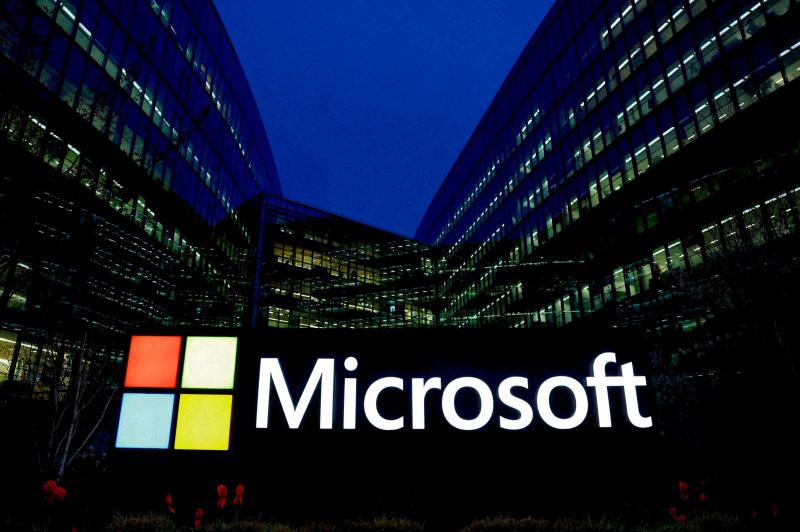Microsoft Corp on Tuesday reported strong quarterly earnings but saw its shares slip on figures showing its crucial cloud computing unit did not grow as strongly as expected.
Microsoft said it made a profit of US$22 billion on US$64.7 billion in revenue in the recently ended quarter, up from the same period a year earlier.
Cloud unit revenue of US$36.8 billion, however, disappointed investors and shares slid nearly three percent in after-market trades.

Photo: Gonzalo Fuentes, Reuters
Money brought in from cloud computing has driven blockbuster earnings quarter after quarter, and a hint that stellar growth may be slowing was enough to give investors pause.
Microsoft is among the major contenders in the race to build out artificial intelligence (AI) systems, pouring billions of dollars into the technology in the hope it will pay off.
The company is keen to monetize generative AI, having moved the fastest to implement it across all its products, and pouring US$13 billion into OpenAI, the start-up stalwart behind ChatGPT.
CFRA Research viewed the earnings results as "largely in line" across Microsoft's core businesses and believes that the company is "incrementally improving" the money it makes from AI, according to senior equity analyst Angelo Zino.
"Still, we acknowledge that the better-than-expected cloud results from Alphabet Inc last week had investors looking for more," Zino said.
Google-parent Alphabet reported profit and revenue that beat expectations as its AI-amped cloud and search ads businesses thrived.
The AI frenzy has helped Microsoft's cloud computing business grow in the double digits, which analysts said could be hard to sustain.
Microsoft's big stake in OpenAI along with its own Copilot AI help it maintain a leadership position in AI, according to Emarketer senior analyst Gadjo Sevilla.
Revenue from Microsoft's AI-infused "Intelligent Cloud" unit was US$28.5 billion, a 19-percent increase from the same quarter a year earlier, according to the earnings figures.
Microsoft CEO Satya Nadella said on an earnings call that use of its AI offerings is ramping up, from workplace software to Bing search and Copilot AI relied on by developers.
"I'm energized about the opportunities ahead," Nadella said. "We are investing for the long term in our fundamentals, in our innovation and in our people."
Microsoft's Azure platform drove a strong increase in revenue from server products and cloud services, according to the company.
Nadella said the company is "focused on meeting the mission-critical needs of our customers across our at-scale platforms today, while also ensuring we lead the AI era."
Microsoft reported a net income of US$88.1 billion for its fiscal year on revenue of US$245.1 billion, up 22 percent and 16 percent respectively.
Money taken in by Microsoft's Xbox video game unit leaped 61 percent, boosted by the acquisition of Activision Blizzard Inc, according to earnings figures.
Microsoft said costs to attract visitors to its search and news services rose 19 percent, as it pressed to compete with Google.

TAKING STOCK: A Taiwanese cookware firm in Vietnam urged customers to assess inventory or place orders early so shipments can reach the US while tariffs are paused Taiwanese businesses in Vietnam are exploring alternatives after the White House imposed a 46 percent import duty on Vietnamese goods, following US President Donald Trump’s announcement of “reciprocal” tariffs on the US’ trading partners. Lo Shih-liang (羅世良), chairman of Brico Industry Co (裕茂工業), a Taiwanese company that manufactures cast iron cookware and stove components in Vietnam, said that more than 40 percent of his business was tied to the US market, describing the constant US policy shifts as an emotional roller coaster. “I work during the day and stay up all night watching the news. I’ve been following US news until 3am

UNCERTAINTY: Innolux activated a stringent supply chain management mechanism, as it did during the COVID-19 pandemic, to ensure optimal inventory levels for customers Flat-panel display makers AUO Corp (友達) and Innolux Corp (群創) yesterday said that about 12 to 20 percent of their display business is at risk of potential US tariffs and that they would relocate production or shipment destinations to mitigate the levies’ effects. US tariffs would have a direct impact of US$200 million on AUO’s revenue, company chairman Paul Peng (彭雙浪) told reporters on the sidelines of the Touch Taiwan trade show in Taipei yesterday. That would make up about 12 percent of the company’s overall revenue. To cope with the tariff uncertainty, AUO plans to allocate its production to manufacturing facilities in

Six years ago, LVMH’s billionaire CEO Bernard Arnault and US President Donald Trump cut the blue ribbon on a factory in rural Texas that would make designer handbags for Louis Vuitton, one of the world’s best-known luxury brands. However, since the high-profile opening, the factory has faced a host of problems limiting production, 11 former Louis Vuitton employees said. The site has consistently ranked among the worst-performing for Louis Vuitton globally, “significantly” underperforming other facilities, said three former Louis Vuitton workers and a senior industry source, who cited internal rankings shared with staff. The plant’s problems — which have not

COLLABORATION: Given Taiwan’s key position in global supply chains, the US firm is discussing strategies with local partners and clients to deal with global uncertainties Advanced Micro Devices Inc (AMD) yesterday said it is meeting with local ecosystem partners, including Taiwan Semiconductor Manufacturing Co (TSMC, 台積電), to discuss strategies, including long-term manufacturing, to navigate uncertainties such as US tariffs, as Taiwan occupies an important position in global supply chains. AMD chief executive officer Lisa Su (蘇姿丰) told reporters that Taiwan is an important part of the chip designer’s ecosystem and she is discussing with partners and customers in Taiwan to forge strong collaborations on different areas during this critical period. AMD has just become the first artificial-intelligence (AI) server chip customer of TSMC to utilize its advanced